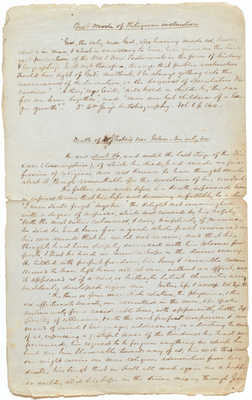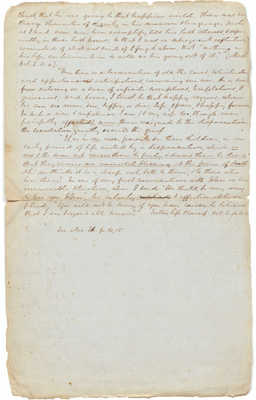Pages
Page 1
Best Mode of Religious instruction
"God, the only wise God, who having made us, know what is in man, & what is necessary to him. has given us the largest proportion of the Old & New Testaments in the form of history & [biography?]. Is it not, therefore, strange that public instruction should lose sight of God's method, & be always getting into the commonness of declaration, or the dryness of speculation dis= cussion? "A story" says [Cesil?]," will hold a child by the ear for an hour together", and "men are but children of larger growth"_" Dr [W'?] Jay's autobiography- Vol. 1. p 164.
Death of [Mr?] [J. Foster's?] son John- his only son.
He was about 16, and until the last stage of the disease (consumption), of which he died, had made no profession of religion, nor was known to have thought made about it, though remarkable for the [?] of his conduct.
His father, some weeks before his death, informed him in express terms that his life was drawing infallibly to a close "I never shall forget" says he "the delight not unmingled with a degree of surprise, which was caused by his reply." "With the most entire calmness, & easy simplicity of manner, be said he had her for a good while pat convinced in his own mind that he could not recover; and that his thoughts had been deeply exercised with his solemn prospects, & that he had an humble hope in the divine mercy. He talked with perfect freedom; his long & invincible [?] second to have left him all at once, without an effort; and it appeared as if a new, or hitherto latent character was suddenly developed before me." [?]'s life & [?]
"His three or four immediate relations, the physician, & the old affectionate servants, was assembled in the room, & he spoke continuously for considerable time, with apparently little dificulty of utterance, & with the most perfect composure & command of mind & language; addressing, or admiting to each of us, expressing a grateful sense of the kindess he had experienced; his request to be forgiven anything in which he had ever been blameable towards any of us; his wish that each one might receive one more religious admonition from his death; his trust that we shall all meet again in a happier world; and his hope in the divine mercy through Jesus
Page 2
Christ, that he was going to that happier world. There was [some?] strange character of dignity in his manner & language, such as I had never seen him exemplify till his last illness, & especially in these last hours; so that I was on subsequent reflection, reminded of what was said of I forget when, that "nothing in his life, can become him so well as his going out of it." [Mark: Act. I. Se. 4].
"Then there is a termination of all The Cases, solicitudes and apprehension anticipations, concerning [one?] [?]. He is same from entering in a sum of infinite corruptions, temptations, & grievances; and borne, I trust, to that happy region, where he can no more sin, suffer, or die; safe, & pure, & happy forever. In such a view & confidence, I am (& my wife too, though more painfully affected), more than resigned to the dispensation; the consolation greatly exceeds the grief
"If, as in our case, parents see their children, in an early period of life visited by a dispensation, which, is one & the same act, raised them to piety, & deems them to die, so that they receive an immortal blessing at the price of death; Oh! methinks it is a cheap cost, both to them, & to those who [love?] them! In one of my first conversations with John on his incurable situation, when I said "We shall be very sorry to lose you John," he calmly {replied} & affectionately, replied "You will not be sorry, if you have cause to believe that I am beyond all know." "Futers life [?]. [?]. 2. p. 61-2.
See who p 14,15.

